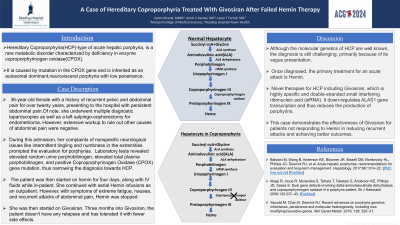Monday Poster Session
Category: Liver
P2991 - A Case of Hereditary Coproporphyria Treated With Givosiran After Failed Hemin Therapy
Monday, October 28, 2024
10:30 AM - 4:00 PM ET
Location: Exhibit Hall E

Has Audio
- SK
Suravi Khanal, MBBS
Reading Hospital - Tower Health
Wyomissing, PA
Presenting Author(s)
Suravi Khanal, MBBS1, Anish Chandra Paudel, MD2, Jason T. Farrell, DO2
1Reading Hospital - Tower Health, Wyomissing, PA; 2Reading Hospital - Tower Health, Reading, PA
Introduction: Hereditary coproporphyria (HCP), a type of acute hepatic porphyria, is a rare metabolic disorder characterized by deficiency of the enzyme coproporphyrinogen oxidase (CPOX). It is caused by a mutation in the CPOX gene and is inherited as an autosomal dominant, neurovisceral porphyria with a low penetrance.
Case Description/Methods: We present a case of a 36-year-old female with a history of recurrent pelvic and abdominal pain for over twenty years, presenting to the hospital with persistent abdominal pain. Of note, she had undergone multiple diagnostic laparoscopies as well as a left salpingo-oophorectomy for endometrioma. Extensive endoscopic and serological workups, including anti-TTG, inflammatory markers (ESR, CRP), and Lyme antibodies, were negative in the past, ruling out celiac, inflammatory bowel disease, and Lyme disease, respectively. However, during this admission, her complaints of nonspecific neurological issues like intermittent tingling and numbness in the extremities prompted the evaluation for porphyrias. Laboratory tests revealed elevated random urine porphobilinogen, elevated total plasma porphobilinogen, and positive Coproporphyrinogen Oxidase (CPOX) gene mutation, thus narrowing the diagnosis towards HCP. The patient was then started on Hemin for four days, along with IV fluids while in-patient. She continued with serial hemin infusions as an outpatient. However, with symptoms of extreme fatigue, nausea, and recurrent attacks of abdominal pain, Hemin was stopped. She was then started on Givosiran. Three months into Givosiran, the patient doesn't have any relapses and has tolerated it with fewer side effects.
Discussion: Although the molecular genetics of HCP are well known, the diagnosis is still challenging, primarily because of its vague presentation. Once diagnosed, the primary treatment for an acute attack includes Hemin. Novel therapies for HCP include Givosiran, which is highly specific and double-stranded small interfering ribonucleic acid (siRNA). It down-regulates ALAS1 gene transcription and thus reduces the production of porphyrins. This case demonstrates the effectiveness of Givosiran for patients not responding to Hemin in reducing recurrent attacks and achieving better outcomes.
Disclosures:
Suravi Khanal, MBBS1, Anish Chandra Paudel, MD2, Jason T. Farrell, DO2. P2991 - A Case of Hereditary Coproporphyria Treated With Givosiran After Failed Hemin Therapy, ACG 2024 Annual Scientific Meeting Abstracts. Philadelphia, PA: American College of Gastroenterology.
1Reading Hospital - Tower Health, Wyomissing, PA; 2Reading Hospital - Tower Health, Reading, PA
Introduction: Hereditary coproporphyria (HCP), a type of acute hepatic porphyria, is a rare metabolic disorder characterized by deficiency of the enzyme coproporphyrinogen oxidase (CPOX). It is caused by a mutation in the CPOX gene and is inherited as an autosomal dominant, neurovisceral porphyria with a low penetrance.
Case Description/Methods: We present a case of a 36-year-old female with a history of recurrent pelvic and abdominal pain for over twenty years, presenting to the hospital with persistent abdominal pain. Of note, she had undergone multiple diagnostic laparoscopies as well as a left salpingo-oophorectomy for endometrioma. Extensive endoscopic and serological workups, including anti-TTG, inflammatory markers (ESR, CRP), and Lyme antibodies, were negative in the past, ruling out celiac, inflammatory bowel disease, and Lyme disease, respectively. However, during this admission, her complaints of nonspecific neurological issues like intermittent tingling and numbness in the extremities prompted the evaluation for porphyrias. Laboratory tests revealed elevated random urine porphobilinogen, elevated total plasma porphobilinogen, and positive Coproporphyrinogen Oxidase (CPOX) gene mutation, thus narrowing the diagnosis towards HCP. The patient was then started on Hemin for four days, along with IV fluids while in-patient. She continued with serial hemin infusions as an outpatient. However, with symptoms of extreme fatigue, nausea, and recurrent attacks of abdominal pain, Hemin was stopped. She was then started on Givosiran. Three months into Givosiran, the patient doesn't have any relapses and has tolerated it with fewer side effects.
Discussion: Although the molecular genetics of HCP are well known, the diagnosis is still challenging, primarily because of its vague presentation. Once diagnosed, the primary treatment for an acute attack includes Hemin. Novel therapies for HCP include Givosiran, which is highly specific and double-stranded small interfering ribonucleic acid (siRNA). It down-regulates ALAS1 gene transcription and thus reduces the production of porphyrins. This case demonstrates the effectiveness of Givosiran for patients not responding to Hemin in reducing recurrent attacks and achieving better outcomes.
Disclosures:
Suravi Khanal indicated no relevant financial relationships.
Anish Chandra Paudel indicated no relevant financial relationships.
Jason Farrell indicated no relevant financial relationships.
Suravi Khanal, MBBS1, Anish Chandra Paudel, MD2, Jason T. Farrell, DO2. P2991 - A Case of Hereditary Coproporphyria Treated With Givosiran After Failed Hemin Therapy, ACG 2024 Annual Scientific Meeting Abstracts. Philadelphia, PA: American College of Gastroenterology.
